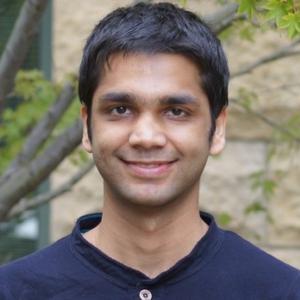ESP Biography
ADITYA GROVER, CS PhD in the Stanford Artificial Intelligence Lab
|
Major: Computer Science College/Employer: Stanford Year of Graduation: Not available. |

|
Brief Biographical Sketch:
Aditya Grover is a Ph.D. student in the department of Computer Science at Stanford University, advised by Prof. Stefano Ermon. He is affiliated with the Artificial Intelligence Laboratory and the Statistical Machine Learning Group at Stanford. Before joining Stanford, Aditya obtained his undergraduate degree in Computer Science and Engineering from Indian Institute of Technology (IIT) Delhi in 2015. Past Classes(Clicking a class title will bring you to the course's section of the corresponding course catalog)M6891: Artificial Intelligence for Sustainability in Splash Fall 2018 (Dec. 01 - 02, 2018)
Artificial intelligence (AI) and machine learning (ML) applications are all around us: the voice behind our phone assistants, the search and recommendation engines on the internet, and most recently, the self-driving cars we are beginning to see on our roads.
Besides providing these services, how else can AI and ML contribute to sustainable development?
In this class, we will look at some of the most exciting advances of AI/ML in the pursuit of sustainable development. These are 17 goals recognized by the United Nations, and include poverty, hunger, health, education, climate change, water, energy, and environment. The class will consist of two case studies (and demos) in light of these goals. With each of these studies, we will lay special focus on how to model these problems from a computational perspective. Finally, we will devote the last half of this class to open challenges and how each one of us as citizen scientists can contribute to these worldwide efforts in using artificial intelligence and machine learning for building a sustainable planet.
M6550: Artificial Intelligence and Machine Learning for Sustainability in Splash Spring 2018 (May. 05 - 06, 2018)
Artificial intelligence (AI) and machine learning (ML) applications are all around us: the voice behind our phone assistants, the search and recommendation engines on the internet, and most recently, the self-driving cars we are beginning to see on our roads. Besides providing these services, how else can AI and ML improve our planet?
In this class, we will look at some of the most exciting advances of AI/ML in the pursuit of sustainable development. These are 17 goals recognized by the United Nations, and include poverty, hunger, health, education, climate change, water, energy, and environment. The class will consist of two case studies (and demos) in light of these goals. With each of these studies, we will lay special focus on how to model these problems from a computational perspective. Finally, we will devote the last half of this class to open challenges and how each one of us as citizen scientists can contribute to these worldwide efforts in using artificial intelligence and machine learning for building a sustainable planet.
|
|
